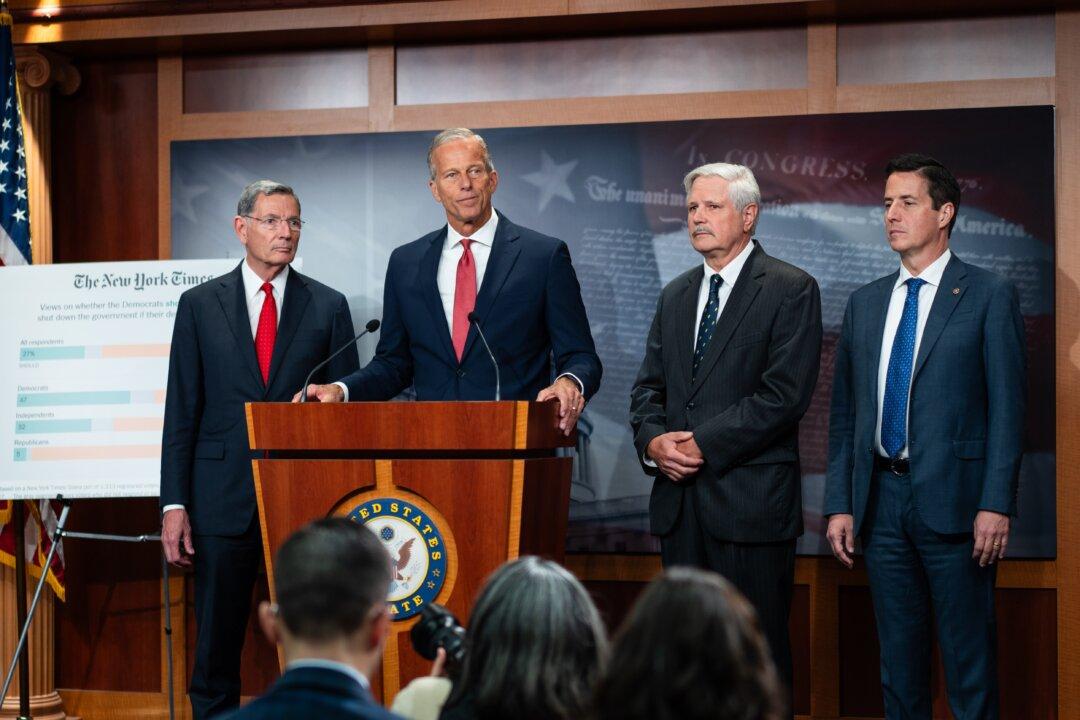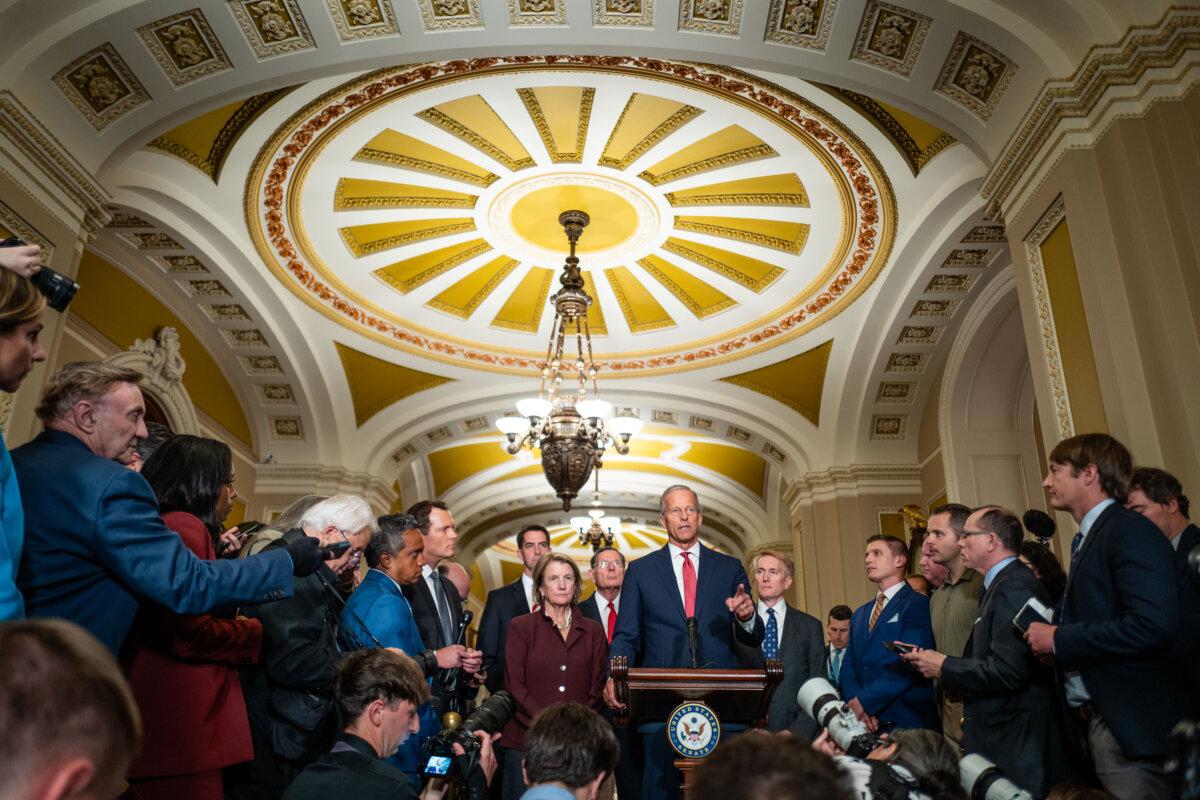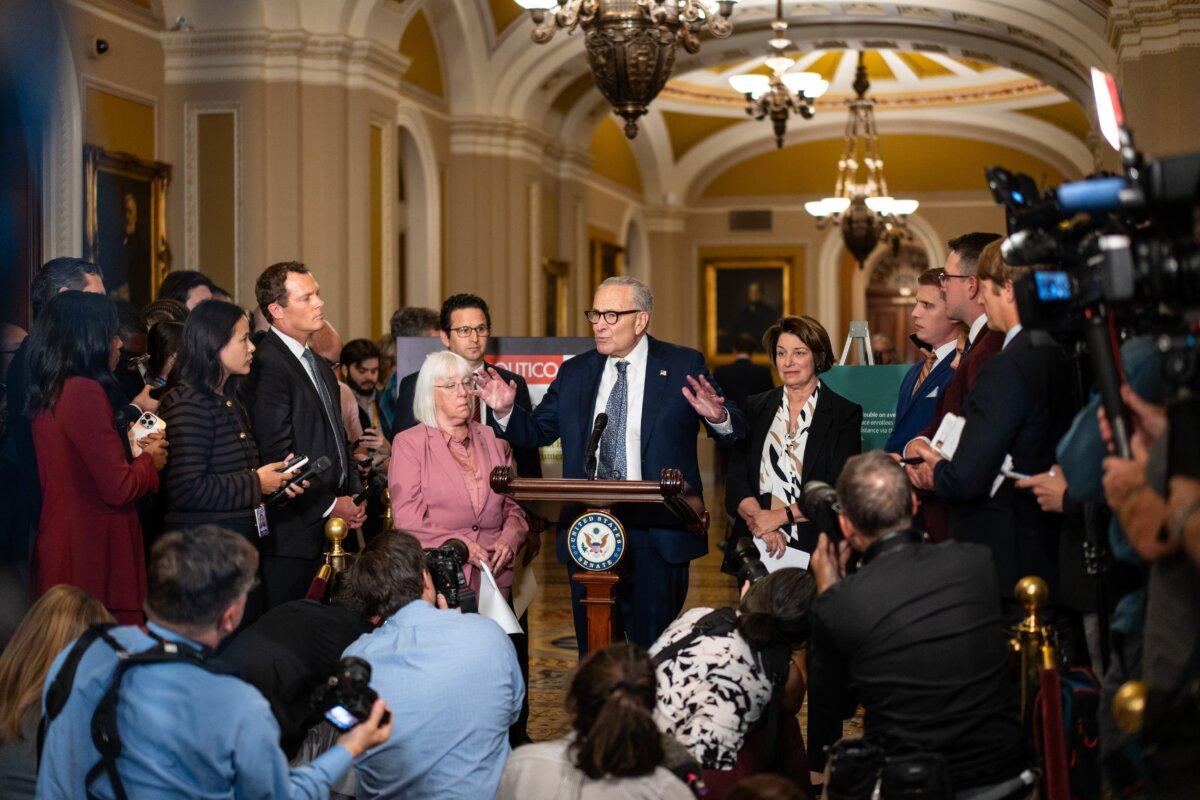Republicans asked for a simple, short-term spending extension while Democrats sought extensive changes in health care funding.

Senate Majority Leader John Thune (R-S.D.), joined by Sen. John Barrasso (R-Wyo.), Sen. John Hoeven (R-N.D.), and Sen. Bernie Moreno (R-Ohio), speaks during a press conference as the government is on verge of shutdown amid partisan standoff, on Capitol Hill in Washington on Sept. 30, 2025. Madalina Kilroy/The Epoch Times
The government has officially shut down after lawmakers on Tuesday evening adjourned early with no agreement on government funding.
Lawmakers will return on Wednesday at 10 a.m. ET.
Ahead of its adjournment, the Senate’s 55–45 vote in favor of advancing the package fell five short of the 60-vote filibuster threshold.
Sen. Catherine Cortez Masto (D-Nev.) and Sen. Angus King (I-Maine), who caucuses with Democrats, joined Republicans in voting for the bill. Sen. Lisa Murkowski (R-Alaska), who voted against the GOP funding bill when it last came before the Senate, flipped her vote in favor of the measure.
Sen. Jeanne Shaheen (D-N.H.), the only Democrat to back passage of a Republican funding bill in March, voted against the bill. Sen. Rand Paul (R-Ky.) broke with his party and voted against the funding bill.
After the Senate failed to secure a supermajority for the White House-backed funding bill, White House Office of Management and Budget Director Russ Vought on Sept. 30 ordered federal officials to begin executing “their plans for an orderly shutdown.”
“Unfortunately, Democrat Senators are blocking passage of [a government funding extension] in the Senate due to Democrats’ insane policy demands, which include $1 trillion in new spending,” Vought said in the Tuesday evening memo to executive branch administrators.
Earlier this week, Vought directed agencies to prepare plans for layoffs in the event of a shutdown.
Ahead of the shutdown, a resolution sponsored by Democrats was rejected 47-53 along party lines.
Prior to the votes, representatives of each party said they wanted to avoid a shutdown and that their counterparts were responsible for the result.
Republicans sought a short-term extension of current spending levels to allow lawmakers time to finalize appropriations for 2026, while Democrats are refusing to back any continuing resolution that does not include changes to health care-related funding passed by Congress in the most recent budget bill. Both parties appear to believe public opinion is on their side.
Democrats insisted on the need to reverse as much as $1 trillion in health care-related spending provisions of the One Big Beautiful Bill Act and make the COVID-era Affordable Care Act enhanced premium tax credits permanent.
Democrats say their plan is necessary to prevent a loss of health coverage by tens of millions of people and avoid a sharp increase in health insurance premiums.
Republicans have said the Democrats’ proposal would add $1.5 trillion in spending and is an unserious starting point for discussions.
A Sept. 29 meeting of congressional leaders with President Donald Trump, Vice President JD Vance, and Vought failed to produce a resolution.

Senate Majority Leader John Thune (R-S.D.), joined by other Senate Republicans, speaks to reporters as the government is on the verge of shutdown amid a partisan standoff, on Capitol Hill in Washington on Sept. 30, 2025. Madalina Kilroy/The Epoch Times
Ahead of the Senate vote, both parties doubled down on their position.
Democrats repeated their ideas that health care reform is vitally important and requires immediate action.
“Health care creates an urgency,” Sen. Richard Blumenthal (D-Conn.) told The Epoch Times on Sept. 30. “Republicans are saying, ‘Agree to a clean CR and we’ll talk about this stuff later.’ But people get sick regardless of the Republican timetable.”
Rep. Rosa DeLauro (D-Conn.) told reporters she would not trust Republicans’ word that they would negotiate over health care during the normal appropriations process.
“There’s no trust,” DeLauro said. “Remember McCarthy–Biden, they walked away from the deal,” she added, referring to a negotiated spending agreement in 2023 that was not passed into legislation.
Republicans continued to say that Democrats’ insistence on placing complex health-related negotiations on a short-term spending agreement was confusing and unnecessary.
“They’re kind of all over the map,” Sen. Josh Hawley (R-Mo.) told The Epoch Times. “I can’t tell what they want.”
Senate Minority Leader Chuck Schumer (D-N.Y.) said on Sept. 29 that he had made proposals to Republicans related to health care, but did not specify what they were.
When asked by The Epoch Times which health care issues Democrats were advancing, Blumenthal spoke instead about the urgency of addressing health care, adding, “I think it ends with some serious compromise on health care.”

Senate Minority Leader Chuck Schumer (D-N.Y.), joined by other Senate Democrats, speaks to reporters as the government is on verge of shutdown amid partisan standoff, on Capitol Hill in Washington on Sept. 30, 2025.Madalina Kilroy/The Epoch Times
During a White House press conference, Trump said the administration could do things that are “irreversible” during a shutdown, such as “cutting vast numbers” of federal workers.
“I think the record shows that he is firing people regardless of the shutdown,” Blumenthal said. “He just seems to be on that path.”
Sen. Mike Rounds (R-S.D.) expressed optimism that the two sides could strike a deal centered on extending ACA enhanced premium tax credits.
“I just don’t think you’re going to have that much opposition on either side to giving an extension this year to the Obamacare subsidies,” Rounds told The Epoch Times.
Rounds said that could be coupled with a 45-day continuing resolution to allow further appropriations work. However, he said: “I don’t know whether Democrat leadership can actually accept not going to a shutdown. They may very well feel they have to do a shutdown just to show their far left base that they’ll do it.”
Jackson Richman contributed to this report.